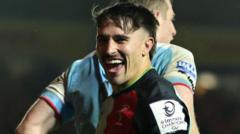
What do Shohei Ohtani , Pink Floyd member David Gilmour, father-son duo LeBron James and Bronny James, USC’s white horse mascot Traveler, Garfield High School and Roosevelt High School all have in common? The answer: they’re all playing in Los Angeles on Friday night, as four games and one concert will overlap in a city known for heavy traffic. Advertisement With five major venues with the capacity to host about 240,500 spectators, not to mention the stadium workers, team staff and anyone else working these events, there’s the potential for a traffic nightmare for fans, commuters and anyone else trying to get anywhere in L.A.
on Friday evening. The first pitch in Game 1 of the World Series is at 5:08 p.m.
PT at Dodger Stadium. At 7 p.m.
PT, the Lakers and the Suns tip off at Crypto.com Arena. At 7:30 p.
m. PT Gilmour takes the stage at Intuit Dome, while Garfield High School and Roosevelt High School take the field in the East LA Classic at SoFi Stadium. At 8 p.
m. PT, USC takes on Rutgers at Los Angeles Memorial Coliseum. If the maximum speed limit is 65 mph on most California freeways, 55 mph on two-lane undivided highways and 25 mph in residential and business districts in L.
A., how long will it take to get anywhere in the city Friday night? This isn’t an SAT test — but here’s what to expect. What it means for car travel and public transit In short: expect traffic.
According to city officials , preparation included sending out 28 traffic engineers to create specialized routes, like a Dodger Stadium Express Lane, and more than 100 police officers to direct traffic. The city also increased the number of buses going to Dodger Stadium, and L.A.
Metro is running added service. Organizations like the Lakers encouraged fans to preplan routes and consider public transportation or ridesharing. But not all arenas are created equal.
While baseball fans can get the Dodger Stadium Express shuttle — free for ticket holders — from Union Station, lines will be long after the game and the walk to the Metro is far. The L.A.
Metro posted a guide video online, which involved a 25-minute walk through crowded parking lots and a pedestrian bridge over the highway — which swiftly faced backlash over concerns about pedestrian safety and critiques of L.A.’s transit accessibility.
Advertisement SoFi Stadium and Intuit Dome also lack close metro access. Lakers and USC fans have it easier, with Metro stations next door to Crypto.com Arena and Los Angeles Memorial Coliseum.
Is this a preview of LA 2028? Hopefully not. City officials have promised that Los Angeles will go “car-free” for the 2028 Summer Olympics. That means the city has fewer than four years to extend its rail lines, add buses and clear traffic lanes in anticipation of the event, which will include events at SoFi, Crypto.
com and Memorial Coliseum, along with competitions in Long Beach and Temecula. It’s a major shift for a city — and region — built for cars. Like many cities in the American west, public transportation is not as comprehensive and accessible as say the Dodgers’ competitor in New York.
Plus, transit agencies including the Metro are struggling to bring ridership back to pre-pandemic levels. The question is if L.A.
can shift that mentality — and get it done in time . What our Lakers writers has to say I live roughly six miles from Crypto.com Arena.
It typically takes me 25 to 30 minutes to drive to the arena. I aim to get there at least two-and-a-half hours early, so for a 7 p.m.
PT tip-off, that means leaving a little before 4 p.m. PT to factor in parking and to be settled around 4:30 p.
m. PT. Today, though, I’m giving myself at least an hour to get there, as there are also a lot of street closures and construction near me.
Speaking with other reporters at shootaround this morning, everyone planned to leave at least 30-ish minutes earlier than normal. I grew up in Los Angeles and am used to the traffic. I understand that anywhere from five to 30 minutes can be randomly added to a trip after you start driving.
I find these types of warnings tend to be a little overblown in terms of actual impact, but I’m also not going to risk it. — Jovan Buha, Lakers beat writer (Photo: Joe Sohm / Visions of America).














